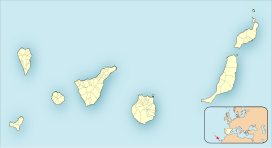Teide
| Teide | |
|---|---|

Teide seen from the north
|
|
| Highest point | |
| Elevation | 3,718 m (12,198 ft) |
| Prominence | 3,718 m (12,198 ft) Ranked 40th |
| Isolation | 895 kilometres (556 mi) |
| Listing |
Country high point Ultra |
| Coordinates | 28°16′23″N 16°38′22″W / 28.27306°N 16.63944°WCoordinates: 28°16′23″N 16°38′22″W / 28.27306°N 16.63944°W |
| Geography | |
| Location | Tenerife, Canary Islands, Spain |
| Geology | |
| Mountain type | Stratovolcano atop basalt shield volcano |
| Last eruption | November 1909 |
| Climbing | |
| First ascent | 1582 |
| Easiest route | Scramble |
Mount Teide (Spanish: Pico del Teide, pronounced: [ˈpiko ðel ˈtei̯ðe], "Teide Peak") is a volcano on Tenerife in the Canary Islands, Spain. Its 3,718-metre (12,198 ft) summit is the highest point in Spain and the highest point above sea level in the islands of the Atlantic.
If measured from the ocean floor, it is at 7,500 m (24,600 ft) the highest volcano in the world base-to-peak outside of the Hawaiian Islands. Its elevation makes Tenerife the tenth highest island in the world. It remains active: its most recent eruption occurred in 1909 from the El Chinyero vent on the northwestern Santiago rift. The United Nations Committee for Disaster Mitigation designated Teide a Decade Volcano because of its history of destructive eruptions and its proximity to several large towns, of which the closest are Garachico, Icod de los Vinos and Puerto de la Cruz. Teide, Pico Viejo and Montaña Blanca form the Central Volcanic Complex of Tenerife.
The volcano and its surroundings comprise Teide National Park, which has an area of 18,900 hectares (47,000 acres) and was named a World Heritage Site by UNESCO on June 28, 2007. Teide is the most visited natural wonder of Spain, the most visited national park in Spain and Europe and – by 2015 – the eighth most visited in the world, with some 3 million visitors yearly. A major international astronomical observatory is located on the slopes of the mountain.
...
Wikipedia

